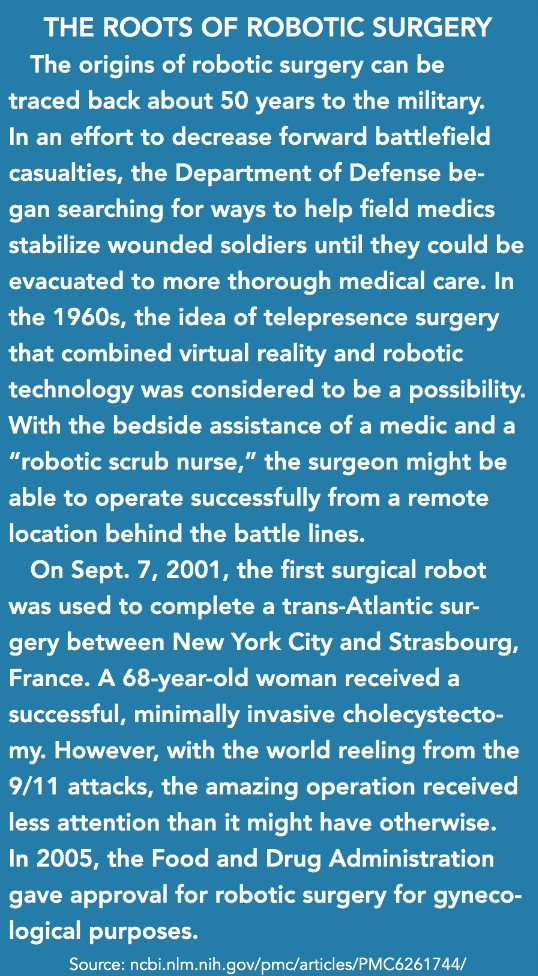Does the thought of a steely, cold metal robot operating on your fragile body feel a bit unsettling? A historic milestone that recently took place at Summerville Medical Center should calm those jitters.
Beth Cook, M.D., recently completed her 500th robotic gynecological procedure at Summerville Medical Center, a Trident Health Lowcountry hospital. As of early November, almost 5,000 such surgeries have been performed at the hospital, including 3,350 obstetric and gynecological procedures. Currently, fellowship-trained, board-certified surgeons keep three robotic systems at the hospital booked for gynecological, orthopedic, spinal, pediatric, reflux, weight-loss, breast, vascular, bariatric and general surgeries.
The surgical training program for robotics is rigorous and extensive, but the results are well worth it, according to Dr. Cook. Although she performs more hysterectomies than any other procedure, common gynecological robotic surgeries also include pelvic organ prolapses, myomectomies, endometriosis excisions, removal of noncancerous ovarian cysts and excision of adhesions.
Working from the robotic console of a 3D high-definition screen, Dr. Cook has enhanced visualization of the operative field. The robotic arm allows for a full 540-degree “wristed” rotation, which gives her extended range of motion. Tiny incisions are made, ports with connected instruments are inserted and then she is ready to perform delicate and precise procedures. The robot acts as an extension of her hands, and, because the video image is true to actual movements, she can operate intuitively with better and faster results.

Patients who choose robotic surgeries are pleased because they require a smaller amount of pain medication and recover at a faster rate than traditional surgery offers. Surgeons like Dr. Cook also appreciate the minimal bleeding and impact on surrounding tissue. In gynecological surgeries, the robotic equipment allows for less overdistension of the abdomen, which minimizes discomfort and expedites the surgical recovery protocol.
Increased visualization allows skilled surgeons to complete these procedures more quickly. For example, a typical hysterectomy can be finished in 35 to 40 minutes. The surgeon can even suture using the robotic arm. However, Dr. Cook points out, “Suitable cases must be chosen wisely. There are still some limitations. Not everyone is an automatic candidate for robotic surgery.”
Summerville Medical Center began its robotic surgeries in late 2012, with Dr. Cook helping to lead the way.
“It’s truly remarkable what our surgeons and surgical staff have accomplished in the past 10 years since our first minimally invasive robotic surgery,” Jeff Taylor, CEO of Summerville Medical Center, reported. “Our team is dedicated to ensuring that Lowcountry families have easy access to high-quality care and providing options like robotic surgery ensures they recover and return home to their families quickly.”
For Dr. Cook, it’s much more personal: “My goal every day is to change the lives of my patients. My passion is caring for women across generations for every decade and milestone in their lives,” she explained. “I want to help them get back to their favorite hobbies and to enjoying their active lives. It is an honor to care for the women in our community.”
By Janet E. Perrigo
